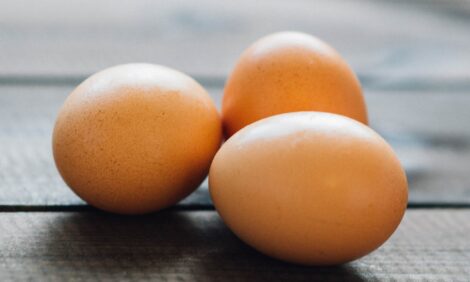



Rapeseed Found to be Resistant to Heat, Enzyme Treatments
THE NETHERLANDS - Wageningen University research failed to improve the digestibility of rapeseed meal for poultry by wet milling, extrusion or the addition of an enzyme.Wet milling and extrusion prior to the addition of pectolytic enzymes did not improve the digestibility of rapeseed meal for poultry, according to Sonja de Vries and colleagues at Wageningen University.
That was the main conclusion of their study, published in Poultry Science, which looked at the effects of processing technologies and pectolytic enzymes on the degradability of non-starch polysaccharides (NSPs) from rapeseed meal in broilers.
Rapeseed meal contains a high level of NSPs that are not well degraded in poultry and interfere with digestion of other nutrients as protein, starch and fat, they explain. By altering physicochemical properties of NSP from rapeseed meal, processing and enzyme technologies might improve digestive utilization of RSM, enhancing its potential as a source of nutrients in poultry diets.
The effects of wet milling and extrusion in combination with pectolytic enzymes on the degradability of rapeseed meal in broilers were investigated in a 3×2 factorial arrangement.
Wet milling and extrusion did not affect total tract apparent digestibility of dry matter, crude protein, crude fat or non-glucose polysaccharides (NGP).
Addition of pectolytic enzymes did not affect total tract apparent digestibility of crude protein and crude fat but improved degradability of NGP by nine to 20 percentage points, independent of prior technological processing. This coincided with an increased NGP concentration in the caeca, indicating that more NGP were made soluble and therefore could enter the caeca and become available for fermentation.
Particle size reduction facilitated solubilisation of polysaccharides from rapeseed meal, increasing the concentration of NGP found in the caeca. However, without the additional pectolytic enzymes, those soluble structure could not be degraded by the caecal microbiota.
Feed intake, bodyweight gain and feed conversion ratio were not affected in this experiment, according to de Vries and co-authors, and no interaction was found between processing technologies and enzyme addition.
Reference
de Vries S., A.M. Pustjens, M.A. Kabel, R.P. Kwakkel and W.J.J. Gerrits. 2014. Effects of processing technologies and pectolytic enzymes on degradability of nonstarch polysaccharides from rapeseed meal in broilers. Poultry Science. 93(3):589-598. doi: 10.3382/ps.2013-03476











